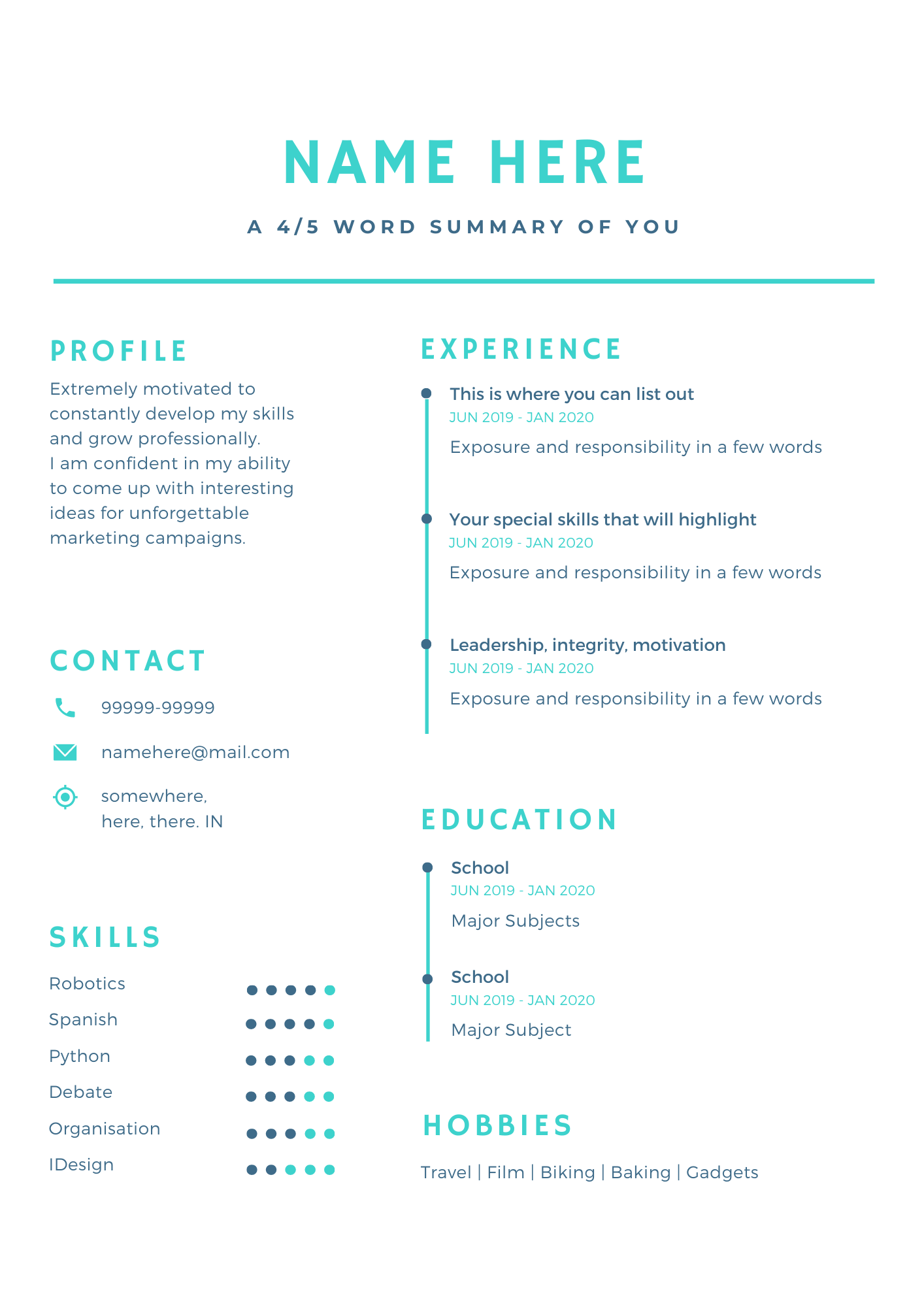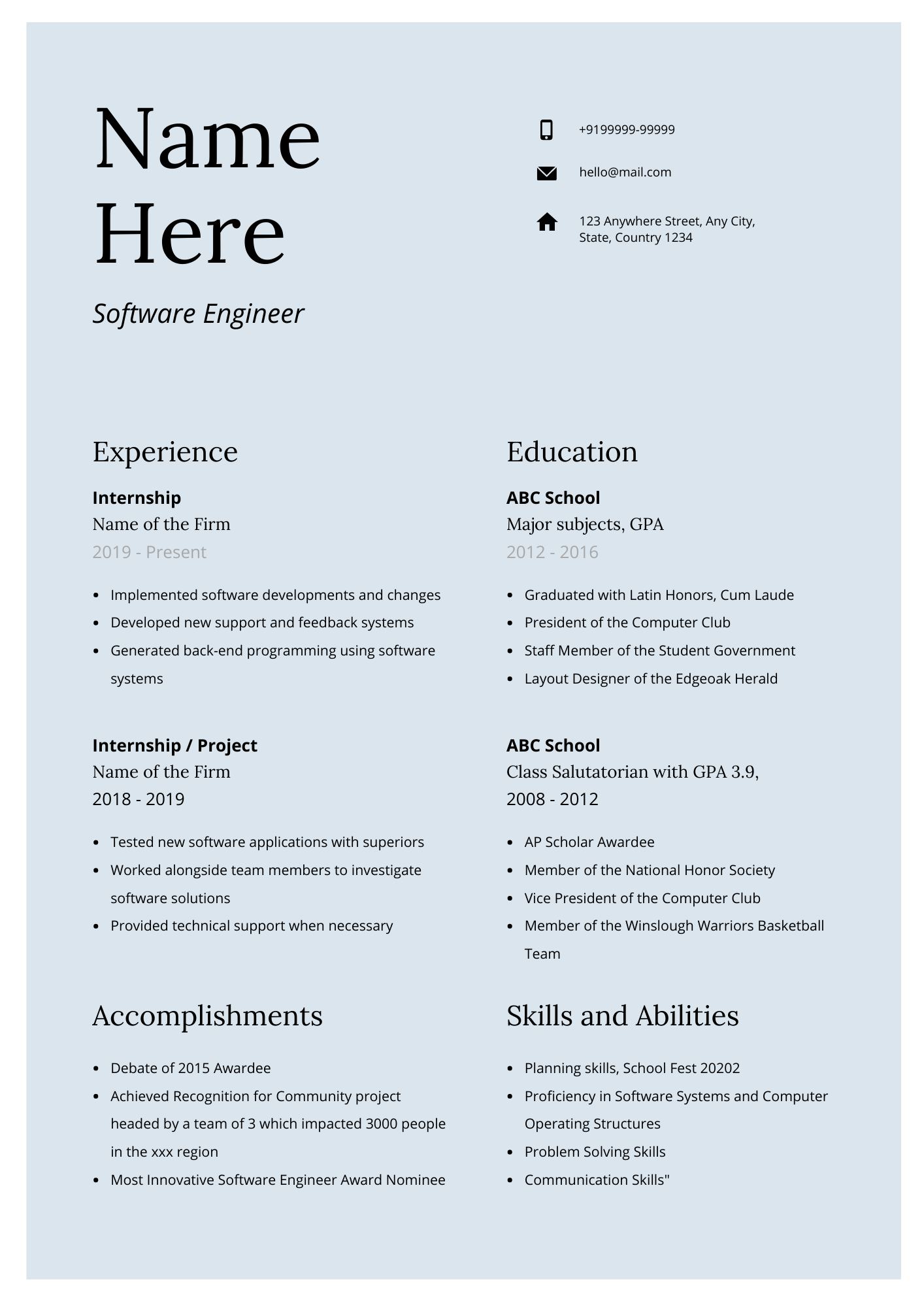How to make a compelling College Resume / Student CV
- Written by UnivAdmitHelp
- Category: Admission Application
- Published on 30 Jul 2020
As discussed, there are many contributors to the admission process, and each one is of immense importance. None so much as the college resume. Consider this the equivalent of your first impression. And what have you heard about first impressions?
“You never get a second chance to make a first impression”!
The Academic Index could be seen as the first step in the admission process. It is the first point of contact that someone has with your profile. It is an automatic screening process where the profiles above a certain numerical cutoff point are screened for the next step. The ones that cross that line move to the second point of contact, which is the college resume. It is the first personal window that the admission counsellor has into your profile. And thus it is essential to craft this well.
There are two ways of doing this:
One: List out all possible accomplishments right from the Art Competition in Grade 2 upto MUN’s and possible internships and ensure that the resume runs into pages, and is thus presumably, impressive. It is a common error to overwhelm the college resume with every possible bit of information in the hope that it would impress the reader. Unfortunately, it achieves the opposite. (I have heard colleagues moan in pain when they are faced by endless pages of candidate resumes before an interview) The reader loses interest in the application the moment it becomes a list of achievements with no specific focus area. Do not use the Student CV to overwhelm the reader with superfluous data points.
Two: Craft a concise, precise, professional student resume which serves as a snapshot of your profile. There is always a fear of failure, “what if I don’t write about this or that, will it cost me my admission?” In our opinion, it’s safer to err on the side of brevity. The purpose of the Resume is to provide a snapshot, and to encourage the reader to turn the page, to look at the next part of your profile (more on that soon!).
If you consider that the resume could be like a trailer for your movie, then you have to make the reader want more of it. The whole movie. And a good trailer, a good movie, has a very solid story. The crux of a good resume lies in the elements that you carefully select. These in turn, in the hands of a good guide, can turn into a great story.
If you view the CV as a selling tool, you can use it to not just narrate your story, but put forward your details in a way that you can get chosen for the next stage of the process.
It is an objective narration. Here's what you can include when you're writing your resume as a college student or recent graduate. The main focus is on you, as a perfect candidate while highlighting your differentiated skills. For instance, a college resume of an Arts student could include the education history, awards and recognition in the field of Art; maybe some internships under a great teacher or firm. The skill sets would include digital skills like Adobe Illustrator or Procreate, Event Management, Languages, and a top-notch account on social media!
Include:
- Your academic history, along with the name of your school and degree,
- Achievements and Awards including high GPA
- Projects which earned critical appreciation and which are relevant to your profile
Stay clear of:
- Unquantifiable pieces like personality types
- Commonplace skills like MS Excel etc.
- Languages that you are not really sure of
- Exposure to a hobby at a younger level which does not contribute to your personality builiding
How can you ensure that the CV remains interesting?
- Use action words like organised, led, performed, accomplished, excelled, provided.
- Quantify, whenever possible. Put a number to it. You might say: I organised medical aid for a community of 2000 migrant labourers over a period of 3 weeks.
- Arrange in a chronological order - the most recent events on top.
- Use bullet points.
- Do not add too many design elements. Remember, everything you choose to put into the one or two pager should have a purpose.
- Be consistent in your style.
- Be concise. Keep it to one page because it is a “Snapshot”. Condense your achievements into an easy-to-read format.
- Keep it short. One page is great.
- A good font is Times New Roman with a size of 11 because it is professional and fuss-free.
- There is no harm in using a pre-set template on Word, or some other platform. Taking professional help does not lessen the impact of your identity. It is specifically designed to help you shine better.
Here are some examples of formats you could use, and a template that might help!


--
Further Reading:
Will I be able to get an admission into an IVY League?
Before you apply in an International University
Recent Posts
-

Comprehensive List of 30+ questions that High School Indian Parents and Students ask for US Admissions..
-

Common App Essay Tips 2025
-

Best extra-curricular activities for college admission for Indian students
-

How Many Universities Should You Apply To? Expert Tips for U.S. and U.K. Admissions for Indian Students
-

Step-by-Step Guide to Creating an Exceptional Capstone Project for Indian Students




